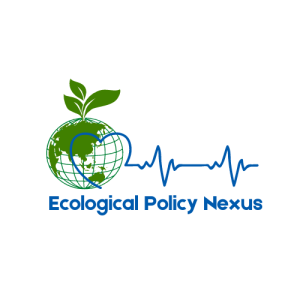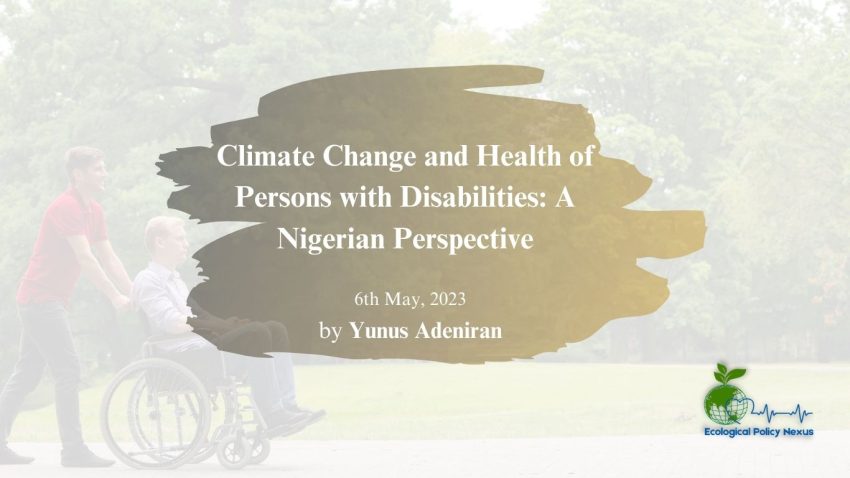Climate change can be described as long-term shifts in temperatures and weather patterns. Also in its simplest form means the earth is getting warmer and the associated problems this causes for people and the planet we live on (United Nations, 2023). One of these problems is challenges to the health and wellbeing of any population – Nigeria is not an exception. Despite having a plethora of natural resources which can be translated into economic gains and sustainable development for her citizens, this is not the case; rather attainment of sustainable development goals continues to be underwhelming. With growing impacts of climate change on health and other areas of life, it is pertinent to understand the situational and health context for persons with disabilities in the Nigerian setting.
Persons with disabilities in Nigeria
The World Health Organization (WHO) reports that there are over 25 million persons living with disabilities in Nigeria (World Health Organization, 2011). The poor inclusion disabled people in development and development processes are well documented. However, there was a ray of hope when President Muhammadu Buhari in 2019 signed into law the Discrimination Against Persons with Disabilities (Prohibition) Act 2018 (Human Rights Watch, 2019). Concerned advocates, disability-focused organizations, and communities such as the Joint National Association of Persons with Disabilities (JONAPWD) saw enactment of the law as a turning point and future positive transformation for all persons with disabilities. While this was a laudable achievement by the Buhari government-led administration, several areas of focus came into play for JONAPWD, civil society organizations and disability advocates. Areas such as health, education, livelihood, empowerment, and inclusive social development as recommended by WHO community-based rehabilitation model were prioritized. Advocacy on domestication of the National disability law at sub-national levels have also been championed by various organizations of persons with disabilities with notable success in some Nigerian States like Lagos, Kaduna, and a few others.
Unfortunately, the issue of climate change and its impacts on quality of life for persons with disabilities (PWDs) is rarely brought into the spotlight. Within JONAPWD are associations for visual-impaired (blind) persons, hearing-impaired (blind) persons, people with spinal cord injury, physically disabled persons, people having albinism (albinos), persons with psychosocial disabilities, and persons who are dwarf, persons having multiple disabilities like deafblindness. Quality of life will undoubtedly deteriorate for these vulnerable groups if impacts of climate change on these groups are ignored or provided less attention. An international disability-focused non-government organization has also highlighted how wellbeing of persons with disabilities are adversely affected by decreasing food security and resulting malnutrition, reduced access to clean water, sanitation, and hygiene (WASH), increasing emergencies due to extreme weather events, displacement, human security, and protection issues (Christian Blind Mission, 2012).
Health and persons with disabilities in Nigeria
In Nigeria, the National Health Insurance Authority (NHIA) is saddled with responsibility of ensuring financial access to quality healthcare for all Nigerians regardless of their disability status so that no one is left behind towards achieving sustainable development goal (SDG) 3 good health and wellbeing (National Health Insurance Authority, 2023). However, most PWDs in the country still struggle to access basic healthcare services owing to challenges like inaccessible information especially for the deaf or blind, inaccessible physical structures, inadequate finance, extreme poverty, and inadequate social workers.
Climate stressors such as rising temperature, extreme heat, heavy rainfall events, and rising sea levels have exacerbated health issues connected to malnutrition; water, sanitation, and hygiene (WASH) problems; respiratory diseases and malaria (USAID, 2019). Climate change and incessant weather events has negatively impacted agricultural activities and food production in Nigeria. It has been projected that food shortages will worsen, and malnutrition will increase in the poorest regions across the world (United Nations, 2020). The extreme poverty in Nigeria has hindered the ability of some communities to feed themselves and this will only remain dire if appropriate actions are not taken.
Climate change has also contributed to the disruption of availability and access to basic health care services. The efforts to respond to climate change increases pressure on national budgets thus diminishing the financial ability to make basic health services such as immunization available. WASH problems (contamination of water supplies and outbreak of waterborne diseases), respiratory diseases (accounting for 19 percent mortality rate in Nigeria), malaria (the leading cause of mortality in under 5 children in Nigeria owing to spread by Anopheles mosquito, which is sensitive to temperature and rainfall) have all been attributed to the extreme weather events in Nigeria. For instance, Nigeria experienced the worst floods in a decade during the last months of 2022 due to heavy rainfall and overflowing of rivers which affected more than 4 million Nigerians including about 3 million children. The flood not only damaged people’s homes and farmlands, public health facilities, and water systems, thus increasing the risk of water borne diseases like cholera, diarrhea, and malaria (UNICEF, 2022).
Many disabled persons rely on prosthetic or assistive devices that enhance their physical functions such as hearing aids for hearing-impaired or sunscreen for persons with albinism. During disasters, these devices are often lost or damaged resulting in health consequences or complications for the persons with disabilities. Encountering most persons with albinism in Nigeria has revealed challenges to access and use sunscreen when they are outdoor. Even when the government attempts to provide sunscreen devices, they may not provide high standard and quality devices. Women and girls with disabilities are also among the most vulnerable population and are at heightened risk of experiencing sexual abuse, exploitation, and violence during emergencies. Health needs and provisions peculiar to their gender are unfortunately less prioritized or neglected due to climate change adverse effects (United Nations, 2020). At the sub-national level, it is noteworthy that there are government agencies and departments in some States like the Lagos State Domestic and Sexual Violence Agency (DSVA) which is responsible for coordinating community responses to domestic and sexual violence.
Disability Laws, Climate Change Laws, and Health
Globally, Nigeria is a signatory to established laws and policies on disability, climate change and health. One of these is Article 25 of the United Nations Convention on the Rights of Persons with Disabilities (United Nations, 2006) which recognizes that all persons with disabilities including persons with psychosocial disabilities have a right to health on equal basis with others. Health must be available, affordable, good quality and accessible to all. The National Climate Change Policy for Nigeria also provides a framework to serve as a guide in response to development challenges associated with climate change (Federal Ministry of Environment, 2021). Nigeria is without paucity of laws and policies guiding responses to effects of climate change on health of vulnerable and marginalized PWDs, hence the million-dollar question is what can be done to accelerate positive responses to climate change and promote attainment of good health for all – the Nigerian youths.
The time to act is now.
There are several documents on actions and remedies to consider in tackling climate change effects. However, the role of youths in accelerating these actions cannot be overstated. Awareness and sensitization of the public about climate change, its effects and sustainable economic lifestyle and practices to help address climate change effects are critical to spur Nigeria towards achieving sustainable development. Climate change is well enshrined as SDG 13 of the 17 sustainable development goals, recognizing that urgent actions should be taken to combat climate change and its impact (United Nations, 2015). As a Nigerian youth leader, development practitioner and certified SDG Advocate, I understand how teaching the upcoming generation about SDGs and individual and collective efforts can be catalytic for positive transformation even within the landscape of climate change. Passionate about building the nexus between SDGs 3 and 13 for persons living with disabilities in Nigeria, I recognize that a healthy and developed nation begins with a healthy population irrespective of their disability status.
References
- Christian Blind Mission. (2012). Disability and Climate Change: Understanding vulnerability and building resilience in a changing world – Disability Rights Fund. https://disabilityrightsfund.org/resources/disability-and-climate-change-understanding-vulnerability-and-building-resilience-in-a-changing-world/
- Federal Ministry of Environment. (2021). Resources – Department of Climate Change. https://climatechange.gov.ng/resource/
- Human Rights Watch. (2019). Nigeria Passes Disability Rights Law | Human Rights Watch. https://www.hrw.org/news/2019/01/25/nigeria-passes-disability-rights-law
- National Health Insurance Authority. (2023). About Company – National Health Insurance Authority. https://www.nhis.gov.ng/about-us/
- UNICEF. (2022). Nigeria Emergency Flood Response | UNICEF Nigeria. https://www.unicef.org/nigeria/reports/nigeria-emergency-flood-response
- United Nations. (2006). Article 25 – Health | United Nations Enable. https://www.un.org/development/desa/disabilities/convention-on-the-rights-of-persons-with-disabilities/article-25-health.html
- United Nations. (2015). Climate Change – United Nations Sustainable Development. https://www.un.org/sustainabledevelopment/climate-change/
- United Nations. (2020). Analytical study on the promotion and protection of the rights of persons with disabilities in the context of climate change – Report of the Office of the United Nations High Commissioner for Human Rights | OHCHR. https://www.ohchr.org/en/documents/thematic-reports/analytical-study-promotion-and-protection-rights-persons-disabilities
- United Nations. (2023). What Is Climate Change? | United Nations. Un. https://www.un.org/en/climatechange/what-is-climate-change
- USAID. (2019). Climate Risk Profile: Nigeria | Global Climate Change. https://www.climatelinks.org/resources/climate-risk-profile-nigeria
- World Health Organisation. (2011). World Report on Disability. https://www.who.int/teams/noncommunicable-diseases/sensory-functions-disability-and-rehabilitation/world-report-on-disability

